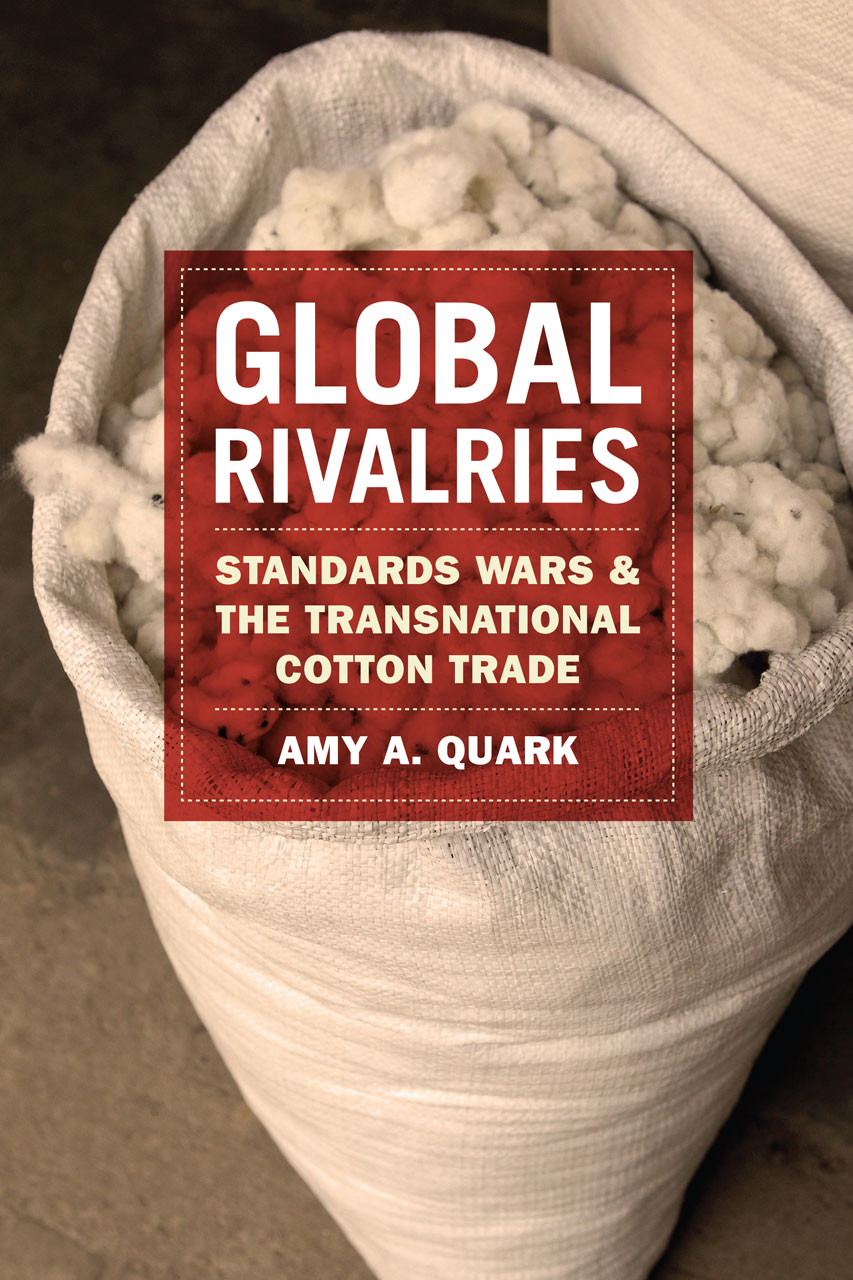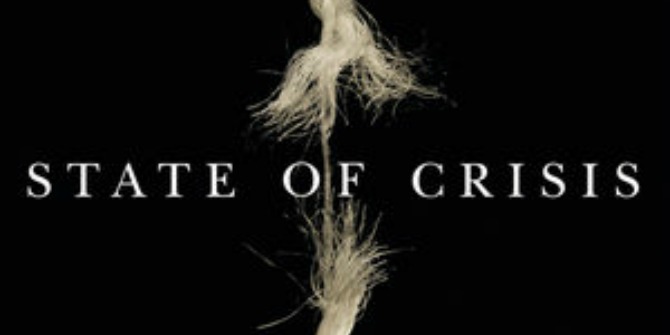 As the economies of China and India continue to grow, these countries are seeking greater control over the rules that govern international trade. Setting the rules carries with it the power to establish advantage, so it is no surprise that negotiations often result in stalemates at meetings of the World Trade Organization. In Global Rivalries, Amy A. Quark aims to explore who makes the rules and how they are enforced, using the lens of cotton; a simple commodity that has become a poignant symbol of both the crisis of Western rule-making power and the potential for powerful new rivals to supplant it. Reviewed by Martin Hearson.
As the economies of China and India continue to grow, these countries are seeking greater control over the rules that govern international trade. Setting the rules carries with it the power to establish advantage, so it is no surprise that negotiations often result in stalemates at meetings of the World Trade Organization. In Global Rivalries, Amy A. Quark aims to explore who makes the rules and how they are enforced, using the lens of cotton; a simple commodity that has become a poignant symbol of both the crisis of Western rule-making power and the potential for powerful new rivals to supplant it. Reviewed by Martin Hearson.
 Global Rivalries: Standards Wars and the Transnational Cotton Trade. Amy A. Quark. University of Chicago Press. August 2013.
Global Rivalries: Standards Wars and the Transnational Cotton Trade. Amy A. Quark. University of Chicago Press. August 2013.
Our global governance institutions are manifestly out of shape. Some, in which developing countries have found their voices, have ground to a halt: the UN climate change negotiations or the World Trade Organisation are perfect examples. Others have never really adapted to 21st century expectations about representation: the UN Security Council manages to be both unrepresentative and paralysed on key questions, as its slow response to the Syria crisis has demonstrated.
These headline-grabbing institutional conflicts are just the tip of the iceberg. Nearly every area of our economic and political life has its own arcane-sounding set of global institutions, the product of its particular needs and historical development. It takes time to understand the minutiae, but often the quirks and conflicts can be fascinating.
Cotton fibre standard-setting is a good example, as Amy A. Quark’s Global Rivalries: Standards Wars and the Transnational Cotton Trade illustrates. Half a century after the end of the British Empire, this is still a regime whose capital is located in Liverpool. Entire countries’ livelihoods seem to turn on the descriptions of cotton fibre length in international standards. There most definitely is an “international cotton community.”
Here we have a fascinating historical account of how these institutions have developed. An intercontinental trade beginning in a period when there was no real-time communication created problems: a merchant would agree to buy a shipment of cotton, but couldn’t be sure of the quality until it arrived; and with fluctuating prices, it sometimes suited one party in such a contract to renege rather than honour a contract when prices had moved in their favour since being agreed. This led the powerful merchants of Liverpool to develop a tripartite structure of industry self-regulation: a uniform set of quality standards, official samples that defined visually what each standard meant, and a system of arbitration to resolve contract disputes. The influence of the Liverpool standards reflected both Britain’s standing in the world and the locus of power at the top of the value chain.
In the book’s persuasive theoretical introduction, Quark argues that international institutions such as these standards reflect neither global power relations, nor “historical contingency and serendipitous events” alone, but rather the two combined, growing up in an environment of multiple conflicts on different levels and between different sets of actors. “Projects of market expansion are often lopsided, scattered and pieced together in a trial-and-error way as actors seek to solve the problems they face given their position within historically and spatially specific processes of capital accumulation.”
This leads to a characterisation of three types of actors: dominant actors, who will seek to preserve existing institutional arrangements that give them an advantage by adapting them enough to satisfy their rivals; rival actors, whose objective is to redirect the bias in institutions towards themselves; and finally, marginalised actors, who will tend to seek a more radical change in institutions, to protect themselves from being disadvantaged by the other groups. This is an interesting characterisation that accords with observations from other areas such as IMF and World Bank governance, in which powerful emerging market countries have seemed more interested in increasing their influence within Western-dominated institutions than in a complete overhaul.

The other interesting insight here is the treatment of governments, businesses and social movements as distinct actors who may be in conflict with their peers or with each other, leading to a variety of different axes of conflict. In the first half of the twentieth century, US cotton merchants have taken issue with the Liverpool standards, which they consider disadvantageous. But when the US government takes an interest on behalf of the cotton producers, these traders accept the Liverpool standards as ‘international’ in an unsuccessful attempt to stave off domestic regulation. Decades later, the same strategy of claiming standards as ‘international’ is used by US industry, this time in alliance with the US government. The rival challenger now is the Chinese state and its cotton industry, and the importance of standards being ‘internationally accepted’ is now enhanced by the reference to international standards in WTO rules.
The Chinese strategy appears to be clear enough: first it imports the international standards and builds state-of-the-art testing facilities, then it uses its acquired expertise to adapt the standards in ways that benefit its own producers. The Liverpool Cotton Association becomes the International Cotton Association, and sets out on an aggressive internationalisation to retain its position in the face of the Chinese challenge. We see how cotton producer groups in different countries must think strategically about how to navigate this shifting terrain to maximise their own advantages.
The book is packed with detail, and yet the accounts of nuanced technical disputes don’t get tiring, because it’s situated in a narrative of global conflict. Quark has clearly spent years immersed in her topic, attending industry conferences and interviewing participants, so she’s able to colour her accounts with little vignettes and personal asides. This makes it a very journalistic account in places.
That journalistic style is where I missed something from an academic book. Sections explaining the selection of cotton as a case study, and setting it in comparative context, were quite brief, and I never quite got to the bottom of how generalisable the book’s convincing analysis of the power dynamics of this one industry were. I’m quite sure that Quark’s description of the positions and strategies of dominant, rival and marginalised actors works for cotton standards, but from this book alone it’s hard to know whether cotton is a typical example, or one with unique characteristics, and hence whether the cotton standards case study proves the broader hypothesis.
That said, this is a useful contribution to broader debates about global governance in an era of emerging market power, as well as a fascinating read.
———————————————
Martin Hearson is a doctoral researcher in the international relations department of the London School of Economics and Political Science. With a background working in advocacy for international NGOs, he now focuses on the political economy of international taxation in developing countries. Read more reviews by Martin.





